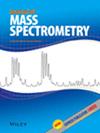Does deprotonated benzoic acid lose carbon monoxide in collision-induced dissociation?
IF 1.9
3区 化学
Q3 BIOCHEMICAL RESEARCH METHODS
引用次数: 0
Abstract
Decarboxylation is known to be the major fragmentation pathway for the deprotonated carboxylic acids in collision-induced dissociation (CID). However, in the CID mass spectrum of deprotonated benzoic acid (m/z 121) recorded on a Q-orbitrap mass spectrometer, the dominant peak was found to be m/z 93 instead of the anticipated m/z 77. Based on theoretical calculations, 18O-isotope labeling and MS3 experiments, we demonstrated that the fragmentation of benzoate anion begins with decarboxylation, but the initial phenide anion (m/z 77) can react with trace O2 in the mass analyzer to produce phenolate anion (m/z 93) and other oxygen-containing ions. Thus oxygen adducts should be considered when annotating the MS/MS spectra of benzoic acids.
去质子苯甲酸在碰撞诱导解离过程中会损失一氧化碳吗?
众所周知,脱羧是碰撞诱导解离(CID)中去质子化羧酸的主要碎裂途径。然而,在 Q-orbitrap 质谱仪上记录的去质子化苯甲酸(m/z 121)的 CID 质谱中,发现主峰是 m/z 93,而不是预期的 m/z77。根据理论计算、18 个 O-同位素标记和 MS3 实验,我们证明苯甲酸阴离子的碎裂始于脱羧,但最初的苯醚阴离子(m/z 77)可与质量分析器中的痕量 O2 发生反应,生成苯酚阴离子(m/z 93)和其他含氧离子。因此,在标注苯甲酸的 MS/MS 图谱时应考虑氧加合物。
本文章由计算机程序翻译,如有差异,请以英文原文为准。
求助全文
约1分钟内获得全文
求助全文
来源期刊

Journal of Mass Spectrometry
化学-光谱学
CiteScore
5.10
自引率
0.00%
发文量
84
审稿时长
1.5 months
期刊介绍:
The Journal of Mass Spectrometry publishes papers on a broad range of topics of interest to scientists working in both fundamental and applied areas involving the study of gaseous ions.
The aim of JMS is to serve the scientific community with information provided and arranged to help senior investigators to better stay abreast of new discoveries and studies in their own field, to make them aware of events and developments in associated fields, and to provide students and newcomers the basic tools with which to learn fundamental and applied aspects of mass spectrometry.
文献相关原料
公司名称
产品信息
阿拉丁
4-trifluoromethylbenzoic acid
阿拉丁
4-methylbenzoic acid
阿拉丁
4-methoxybenzoic acid
阿拉丁
Benzoic acid
 求助内容:
求助内容: 应助结果提醒方式:
应助结果提醒方式:


